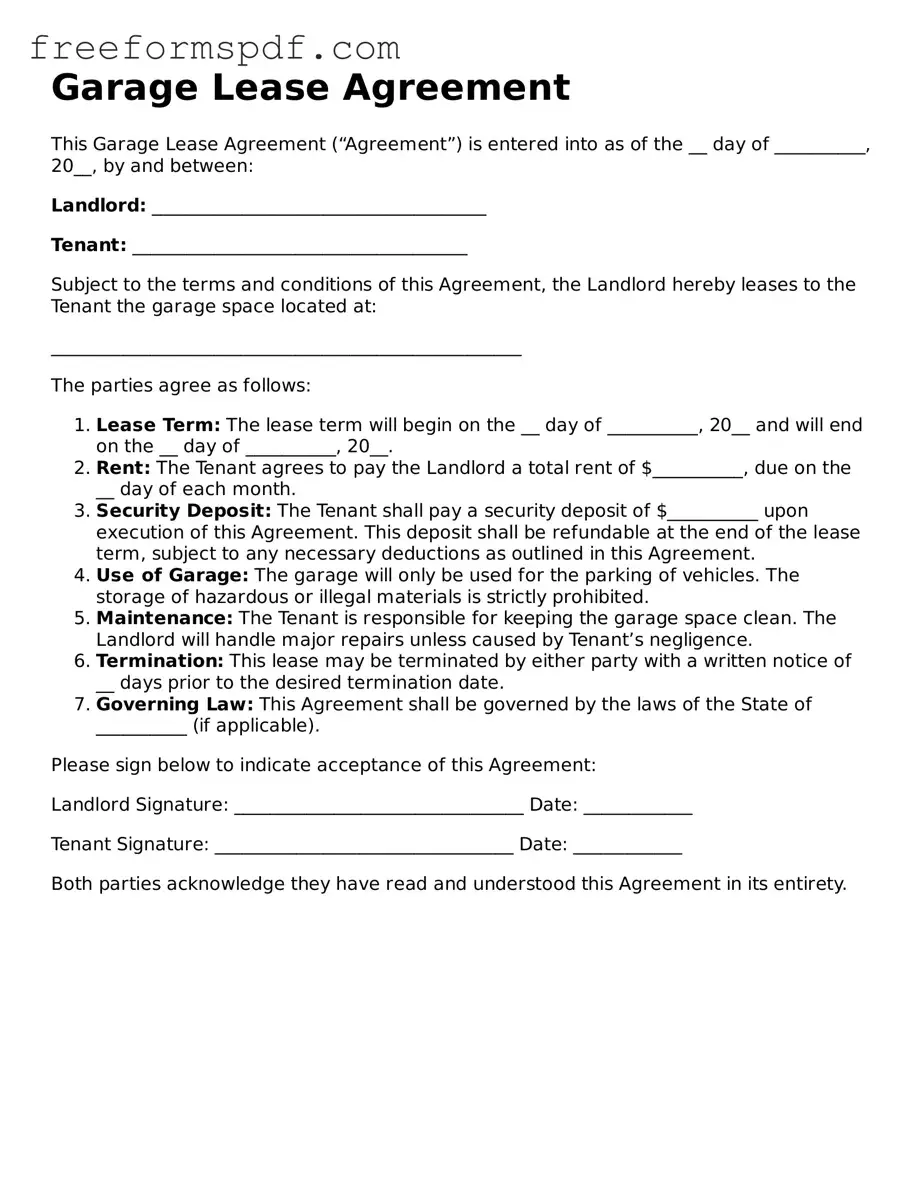Garage Lease Agreement Document
Common mistakes
-
Incomplete Information: Failing to provide all required details can lead to delays or complications. Ensure that names, addresses, and contact information are fully filled out.
-
Incorrect Dates: Entering wrong start or end dates for the lease can cause confusion. Double-check the lease term to avoid issues.
-
Neglecting Signatures: Not signing the document can render it invalid. Both parties should sign and date the agreement to confirm acceptance.
-
Ignoring Terms and Conditions: Overlooking important clauses can lead to misunderstandings. Read through all terms carefully before signing.
-
Not Providing Payment Details: Failing to include payment methods or amounts can create payment issues. Clearly outline how and when payments should be made.
-
Omitting Contact Information: Not listing emergency contact details can be problematic. Include relevant contacts for both parties in case issues arise.
Learn More on This Form
-
What is a Garage Lease Agreement?
A Garage Lease Agreement is a legal document that outlines the terms and conditions under which a landlord allows a tenant to use a garage space. This agreement typically includes details such as the duration of the lease, the rental amount, and the responsibilities of both parties. It serves to protect the interests of both the landlord and the tenant by clearly defining expectations.
-
What should be included in a Garage Lease Agreement?
Key components of a Garage Lease Agreement often include:
- The names and contact information of the landlord and tenant.
- The specific location and description of the garage being leased.
- The lease term, including start and end dates.
- The rental amount and payment schedule.
- Rules regarding the use of the garage, such as storage limitations and maintenance responsibilities.
- Conditions for termination of the lease.
Including these elements helps to ensure clarity and prevent disputes between the parties involved.
-
How long is a typical lease term for a garage?
The length of a garage lease can vary significantly. Common terms range from month-to-month agreements to longer leases of six months or a year. The choice of lease duration often depends on the needs of the tenant and the preferences of the landlord. Shorter leases provide flexibility, while longer leases can offer stability for both parties.
-
Can a Garage Lease Agreement be modified?
Yes, a Garage Lease Agreement can be modified if both the landlord and tenant agree to the changes. Modifications should be documented in writing to ensure clarity and legal enforceability. Common reasons for modifications include changes in rental amounts, lease duration, or specific terms related to the use of the garage.
-
What happens if the tenant violates the terms of the lease?
If a tenant violates the terms of the Garage Lease Agreement, the landlord may have several options. These can include issuing a warning, seeking a remedy for damages, or terminating the lease altogether. The specific actions available depend on the nature of the violation and the terms outlined in the lease. It is crucial for both parties to understand their rights and obligations to address any issues that may arise.
Misconceptions
When it comes to Garage Lease Agreements, several misconceptions can lead to confusion for both landlords and tenants. Understanding these misconceptions can help clarify the leasing process and ensure that both parties are well-informed.
- Misconception 1: A Garage Lease Agreement is the same as a standard residential lease.
- Misconception 2: The agreement is not legally binding.
- Misconception 3: Tenants can use the garage for any purpose.
- Misconception 4: There is no need for written agreements.
- Misconception 5: Rent can be increased at any time.
- Misconception 6: Security deposits are not necessary.
- Misconception 7: The lease can be terminated without notice.
- Misconception 8: Insurance is not required.
- Misconception 9: Maintenance responsibilities are always the landlord's.
A Garage Lease Agreement is specifically designed for the rental of garage space, which differs from residential leases that cover living accommodations. The terms and conditions may vary significantly.
Like any lease agreement, a Garage Lease Agreement is legally binding once signed by both parties. This means that both the landlord and tenant are obligated to adhere to the terms outlined in the document.
Most Garage Lease Agreements specify the permitted uses of the garage. Tenants should carefully review these terms to understand what activities are allowed.
While verbal agreements may seem sufficient, a written Garage Lease Agreement provides clear documentation of the terms, protecting both parties in case of disputes.
Most agreements outline specific terms regarding rent increases. Landlords must follow these terms and provide appropriate notice if they intend to raise the rent.
Many landlords require a security deposit to cover potential damages or unpaid rent. The terms regarding the deposit should be clearly stated in the lease agreement.
Typically, both parties must provide written notice to terminate the lease, as specified in the agreement. Failing to provide notice may result in penalties.
Some landlords may require tenants to carry insurance for their belongings stored in the garage. This requirement should be clearly outlined in the lease.
While landlords often handle major repairs, tenants may be responsible for minor maintenance tasks. The lease should specify the responsibilities of each party.
Other Types of Garage Lease Agreement Forms:
Parking Rental Agreement - This document can stipulate whether utilities are included.
In addition to providing clarity in rental agreements, the Arizona Lease Agreement form can be easily obtained through resources like Arizona PDF Forms, ensuring that both landlords and tenants have access to this essential legal tool for their respective needs.
